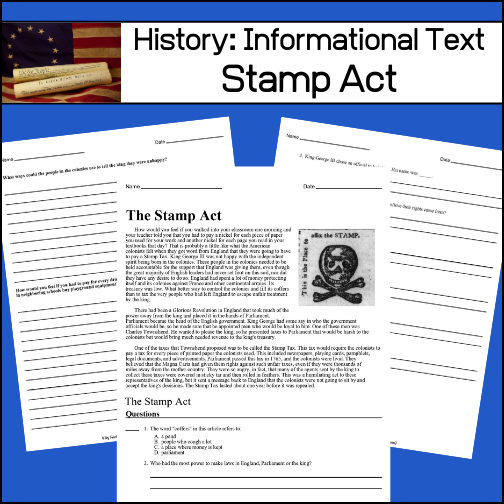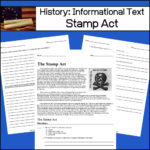Only logged in customers who have purchased this product may leave a review.
Products
- Home
- /
- Shop
- /
- By Subject
- /
- Social Studies
- /
- By Grade
- /
- 6th-8th
- /
- History
- /
- U.S. History
- /
- Stamp Act | History Informational Text
Stamp Act | History Informational Text
$1.75
This informational article will help students understand one of ‘taxes’ imposed upon the colonies by King George prior to the American Revolution. After reading, students will be questions to assess their comprehension of the material.
Related products
-
$3.00Buy Now
This resource, Immigration – Ellis Island – US History Informational Text, has SIX parts: The Early Days, 1892-1954 Gateway to the United States, The Immigrant Experience, Why They Came, From WWII to the Present and Ellis Island Name Change Myth.
In each part, students will have one page of informational text and then a page of multiple choice questions plus one essay question to assess understanding / comprehension. Answer Keys provided.
-
$1.50Buy Now
Studies have shown that word search and other word puzzles can help improve memory, focus, vocabulary, word recognition, pattern recognition, and overall mental acuity! With this in mind, why not engage students in some brain exercises using these puzzles? Perfect to use while you are doing a unit on the Pony Express and the westward expansion of the United States.
-
$1.50Buy Now
This resource, The Intolerable Acts – US History Informational Text, will inform students of the British Parliament’s reaction to the Boston Tea Party…”5 laws” passed referred to by colonist as the Intolerable Acts:
- The Boston Port Act
- Massachusetts Government Act
- Administration of Justice Act
- The Quartering Act
- The Quebec Act
-
$9.99Buy Now
American History – Part 2 for High School (Student Textbook)
Units:
- Causes of WW2
- WW2
- Life in America during WW2
- Cold War Conflicts (1945-1960)
- Postwar America (1952-1060)
- The New Frontier (1960-1963)
- The Stormy Sixties
- America in Turmoil (1968-1976)
- America Seeks Answers (1976-1980)
- The Republican Years (1980-1992)
- The Clinton Years (1992-2000)
- The New Millennuim








Reviews
There are no reviews yet.